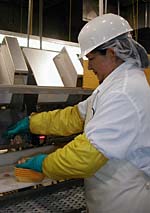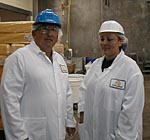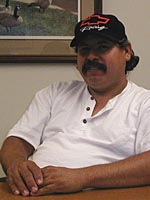By Jeff Horwich
Minnesota Public Radio
November 26, 2001
|
| RealAudio |
Minnesota has had a diverse linguistic tradition. Ojibwe, French, German, and Norwegian have all been languages of commerce. The latest census numbers show the language landscape has shifted once again. More people in Minnesota speak Hmong, Somali, and especially Spanish not only at home, but on the job. This story begins in the central Minnesota town of Cold Spring, along conveyor lines of butchered chickens.
| |
|
|
|
||
"If you look down inside here, you'll see a blade that's going around," said production manager Ken Salchow, taking a visitor behind-the-scenes at Gold'n'Plump Chicken's plant in Cold Spring. "That's a saw blade, and what it's doing is taking this chicken and cutting it in half."
Salchow has to point out circular blades that rotate so fast they seem to stand still. Chilled carcasses hit the blades and split like butter.
"We do have shields and everything around the blades, but they are very sharp and that's why you have to explain to people that they don't go sticking their hands in them. It's very important when you do interpretation that they understand the rules and regulations about shutting equipment of before you work on it, shutting equipment off before sticking your hand in it."
Nearly a quarter of the workers at the Cold Spring plant now primarily speak Spanish. Meat processing jobs have brought many Hispanic migrants to Minnesota. Depending upon whom you ask, they are either in the vanguard or woefully behind in coping with the change.
| |
|
|
|
||
Through an interpreter, line worker Norma Gonzales says she started work at Gold'n'Plump four years ago. She moved from Mexico to join family members in central Minnesota.
"Sometimes when I need to talk about work," she said, "when I need to say something to the supervisor or the lead person, or when I just need to talk, it's very good to have an interpreter."
Gonzales packages chicken parts by hand that drop out from a conveyor in front of her. Typically she'll call for an interpreter when she runs out of chicken or packing materials.
Marisa Guzman is an interpreter who joined Gold'n'Plump three years ago. Her bosses drafted her as an on-call interpreter when they saw her helping out at company meetings.
"Because in the meetings that we had people who would not really understand, so that's what I would do, just explain what the person was talking about," she said. "I got very familiar with that and that's why then they started asking me if I wanted to be an interpreter."
Since then, the company has hired a bilingual employee relations manager. They've also developed an internal testing process that has trained around 20 interpreters. A certification process the company has developed assures they'll abide by codes of ethics and confidentiality. The interpreters are drilled on complex medical terminology, which is especially important to know when workers comp situations arise.
| |
|
|
|
||
Professional interpreters and others say these measures are not necessarily the industry standard. Poor skills and conflicts of interest can create problems when companies recruit their own interpreters internally.
"Packinghouse work is one of the most dangerous jobs in the world," said Bill Pearson, president of United Food and Commercials Workers Local 789. (Listen to a full interview with Pearson.) He has organized Hispanic workers in beef processing plants in the Twin Cities and Long Prairie.
"In some cases the employer will have someone go along with the injured worker who can translate," said Pearson. "But there's a fear, obviously, because the person, if he speaks no English, doesn't have a clue if what the person's telling the doctor or the nurse or whoever he's seeing is true."
The Minnesota Department of Labor works with companies to make sure workers comp documents are translated and workers are aware of their rights. Eduardo Wolle is a mediator-arbitrator for workers compensation with the labor department.
| |
|
|
|
||
"I get a lot of Latinos calling in who are having problems and a lot of times I hear comments about, 'I want to tell my employer this but I'm not trusting the translator because I feel they work for the company, and I feel they're not translating accurately,'" he said. (Listen to a full interview with Wolle.)
But interpreters at Gold'n'Plump say it doesn't seem to be much of an issue. In fact, other employees eagerly seek them out after-hours. Omar Mejia has risen through the ranks at Gold'n'Plump to become what's called a "lead person," and also serves as a translator during the night shift.
"Outside of work I know a lot of people go work for me at the house for interpreting, whether they're fixing their car or going to rent an apartment or anything," Mejia said. "They always look me up."
Marisa Guzman says having in-company interpreters also provides examples of success with English, and success within the company.
"If they see that, for example, we are trying to succeed here in the plant, if they see that it's like, 'hey we have people of our culture trying to better themselves, why can't we do that?'" Guzman said. "And a lot of them try to do the same thing."
The human resource director says for Gold'n'Plump, the decision to invest in the Spanish language is a simple one. Happy, safe, less confused workers mean less turnover in jobs that otherwise change quickly. And less turnover is good for the bottom line.
More from MPR



